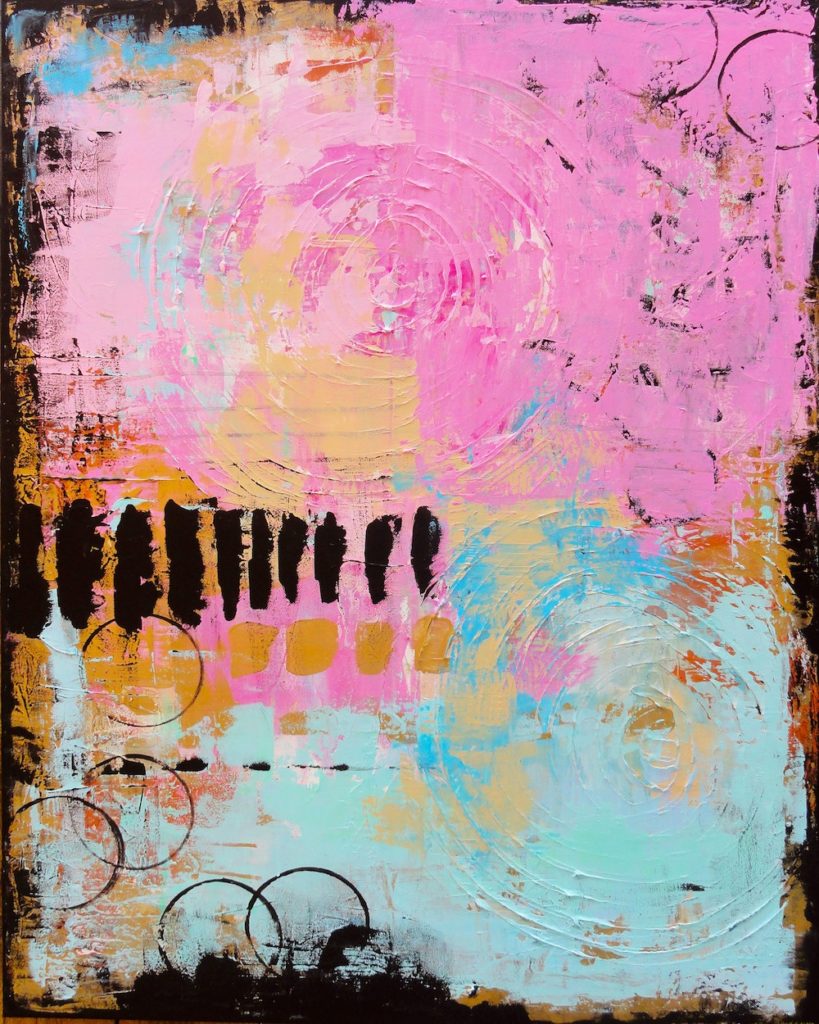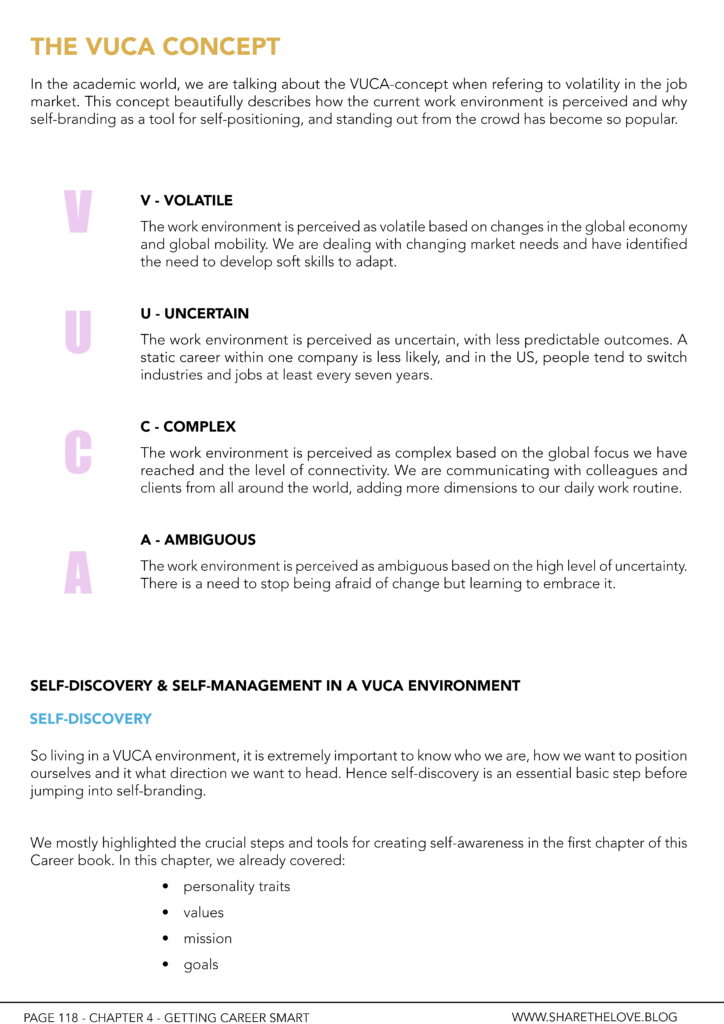
bye-bye VUCA -
hello BANI
Are you already freaking out after reading the headline? Has this headline created a fear of missing out (FOMO)? Well, the BANI model is gaining more traction right now and I wanted to clear some confusion you might have. In this blog post, I will explain what VUCA and BANI is all about and show you some great sources to further educate yourself.
The ebook - Becoming Career Smart
More info and download option
Have a sneak-peek and find more about the outline. You can read and do all exercises online or print it out if you prefer to work with pen and paper.
The VUCA model
Since the 1980s, we are talking about the VUCA concept in order to describe this volatile (V), uncertain (U), complex (C), and ambiguous (A), environment we are living in right now. Already in my latest Becoming Career Smart workbook, I covered the concept of VUCA and its consequences on your very personal job hunting process (see screenshot). Over the last decades, managers and companies have used the VUCA model as a tool to establish a strategy to navigate their business in the storm. Digitalization has brought a lot of change and processes became more agile than they used to be. Even our CVs became more agile than before and people suddenly started to change industries and professions in their mid-career.
However, the VUCA concept is already 40 years old and we observed that the world is spinning at a much higher pace than it used to do.
2018, Jamais Cascio was giving a presentation on what he thought might be a better fit as a concept: The BANI model. This was before the pandemic but when you are reading about what BANI stands for it could not be more suitable for these times we are living in right now.
The BANI concept
BANI is an acronym for Brittle (B), Anxious (A), Nonlinear (N), and Incomprehensible (I). When you are confused right now about why we need a new acronym that describes our complex situation welcome to the club. 40 years ago there was already this sentiment that we almost can’t hold up with the speed of developments around us and so they captured that emotion with volatile, uncertain, complex, and ambiguous. Fast forward 40 years and again we find ourselves in the situation to feel a bit overwhelmed with the developments around us. So you can see the BANI model as an upgrade or a more up-to-date form of the VUCA model.

"VUCA appeared to function as a useful compass in a world that was increasingly difficult to understand. But the pandemic and the biggest health crisis in decades have mixed everything up once more, generating new feelings that are again destabilizing for people. This is where the BANI concept comes in."
Or to use the words by the person behind the BANI model Jamais Cascio: “Situations in which conditions aren’t simply unstable, they’re chaotic. In which outcomes aren’t simply hard to foresee, they’re completely unpredictable. Or, to use the particular language of these frameworks, situations where what happens isn’t simply ambiguous, it’s incomprehensible.”
A deeper explanation of BANI (Source LLYC, 2021)
Brittle (B)
This arises from efforts to maximize efficiency, to wring every last bit of value – money, power, food, work – from a system. Living in an interconnected world means that fragilities that were once restricted to specific places and groups can now cause ripples effects around the world. This condition of fragility can impact the security of enterprises, which runs the risk of bankruptcy and transform the way the market behaves.
Anxious (A)
There are now so many uncertainties (thanks to our VUCA world) that they generate immense anxiety and a constant feeling of impotence. Everyone has started to feel at least a little of the “21st Century disease,” which involves fear over what could happen or go wrong regardless of what we do. An anxious world is one in which we are always hitting refresh to update the news and see what horror shows up next. This is the characteristic anxiety we also find represented by (another!) acronym: FOMO, referring to “fear of missing out.” In other words, it is the fear of being left out of whatever is happening or of losing something. One example is the constant need many feel to be up-to-date on social media in real-time, all day long. Anxiety reflects the anguish and stress of our present times, accentuated by insecurities in relation to health and the risk of contracting COVID-19.
Nonlinear (N)
What was complex became, in turn, nonlinear, without a single meaning, leading to multiple destinations. The systems of cause and effect have become disconnected or disproportional. This leads us directly to the pandemic. It is impossible to have predicted how the emergence of a virus in one part in Asia could cause all the (unfortunately tragic) events we have seen all over the world. The concept of “flattening the curve” of COVID-19 cases is inherently a war against nonlinearity.
Incomprehensible (I)
Attempts to find all the answers no longer make so much sense. Obsessive analysis of the data could overwhelm any person’s ability to understand it, as well as make it hard to distinguish “signal” from “noise.” At this point, the BANI concept enters the realm of resignation. According to BANI, since it is often difficult to try to translate or understand the situation, considering it undecipherable may be what is needed in order to take a step forward and try to find one’s own path.
What are those models (VUCA & BANI) good for?
Well, when you research the concept of VUCA and more recently BANI, you will find that there are different opinions out there whether these models are helpful at all. On the one side, people argue that these concepts are only marketing buzzwords and that there is no real value or benefit behind them. Just another consulting tool to label things instead of acting on them. On the other side, people argue that both models are meant as descriptive acronyms that prove to frame for what people are already experiencing. In that sense, putting a label on a feeling and consequently making it a little more tangible. As I am referring to in my mastermind classes all the time: Humans love labels. We need to categorize information in order to work so having labels we can use for discussions helps us to process and as a consequence getting rid of labels that are not helping us.
From my experience, I would not argue whether we need those concepts or not but whether knowing about that framing is helping you in your very personal situation. Thankfully we are all very different from one another and what is helping one person but not feel supportive to the other. It is very similar to the term TRAILING SPOUSE. For one person, this term is a disgrace, minimizing the role of a partner to a dependent, passive, drag along person. For others, the term itself opens up a world of information, research paper, and studies on google and Co. This information can be very empowering.
"In the case of anxiety, we will probably be able to move forward by exercising greater empathy. The lack of linearity could be offset by more flexibility and anticipation. And there is nothing better than transparency and sincerity to deal with incomprehension. All paths are open for these opportunities, and there are no ready-made answers. One conclusion is clear: Our present could not be better for change."
Conclusion
In this blog post, I wanted to introduce you to the concept of BANI for these reasons:
- take the fear of missing out. Now you heard it and the next time someone talks about it it is nothing fancy new but you are already familiar with
- provide you with this BANI framework and its implications in case you find it useful
- discuss the power of language with you
While the VUCA concept was already preparing us for a time of uncertainty, the BANI concept feels very dystopic and apocalyptic.
For me personally, it draws a very negative image on our future. I like to turn it around a bit and break it down to the core message of BANI: We are living in times of immense change. From my personal experience of living abroad, I embrace change and have very positive connotations with it.
Brittle (B) can mean that we finally will see institutions and social rules fall that are not serving us any longer. Even huge tech companies will need to fight for legitimation and we will question the status quo more bravely and curiously: Is this still serving us?

Your 3 months coaching program
Let’s get your journey started. I guide you through the jungle of question marks and give you the space you need to reflect and acknowledge your real career purpose.

More sources to follow if you want to know more about VUCA & BANI
LLYC, 2021: https://ideasen.llorenteycuenca.com/2021/03/16/after-vuca-the-transformation-to-a-bani-world/
Stephan Grabmeier, 2020: https://stephangrabmeier.de/bani-versus-vuca/#infographic
Jamais Cascio, 20220: https://medium.com/@cascio/facing-the-age-of-chaos-b00687b1f51d
Among all this negativity around us, I also feel way more empathy and concern for the whole than before. People around me who never have discussed climate change are now opening up to the idea of changing their own behavior. Elected leaders of the world are talking about a different approach to stakeholder management and capitalism and a more people-oriented management style. Before the pandemic, I was more pessimistic about those headlines and reduced them to marketing efforts. However, the world as a whole has experienced that change is really affecting all of us. Our lifestyle has been curtailed like never before. We have sacrificed for the common good like never before and I believe there has rarely been a better time to challenge the status quo and bring about change for the better.













Eine Antwort
I like this. Thank you for writing it.